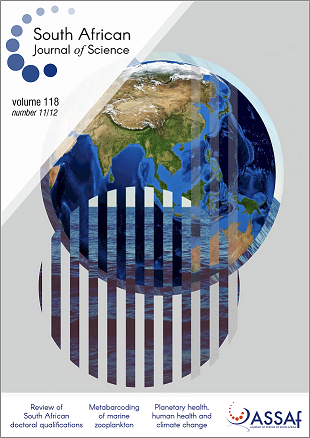Extreme heat events, high ambient temperatures and human morbidity and mortality in Africa: A systematic review
DOI:
https://doi.org/10.17159/sajs.2022/12047Keywords:
Africa, heat-health plans and policy, heat-health interventions, heatwaves, high ambient temperatureAbstract
Temperature extremes vary across Africa. A continent-wide examination of the impacts of heat on health in Africa, and a synthesis of Africa-informed evidence is, however, lacking. A systematic review of articles published in peer-reviewed journals between January 1992 and April 2019 was conducted. To be eligible, articles had to be Africa-specific, in English, and focused on how heatwaves and high ambient temperatures affect morbidity and mortality. A secondary systematic analysis on policies and interventions comprising 17 studies was also conducted, and the findings synthesised together with those of the 20 primary studies. Eleven studies showed that high ambient temperatures and heat waves are linked with increased mortality rates in Africa. These linkages are characterised by complex, linear and non-linear (J or U) relationships. Eight of the nine primary studies of morbidity outcome reported that an increase in temperature was accompanied by raised disease incidence. Children and the elderly were the population groups most vulnerable to extreme heat exposure. Location-specific interventions and policy suggestions include developing early warning systems, creating heat-health plans, changing housing conditions and implementing heat-health awareness campaigns. In summary, this review demonstrates that, while heat-health relationships in Africa are complex, extreme temperatures are associated with high mortality and morbidity, especially amongst vulnerable populations. As temperatures increase across Africa, there is an urgent need to develop heat-health plans and implement interventions. Future studies must document intervention effectiveness and quantify the costs of action and inaction on extreme heatrelated mortality and morbidity.
Significance:
- Empirical evidence shows that the relationship between heat and human health is complex in the African This complexity has implications for the development of interventions and policies for heathealth on the continent.
- This review is important for African policymakers, practitioners and others who support Africa’s adaptation to climate change. Through this review, a compendium of Africa-specific and relevant empirical information is aggregated and made readily available to various interested and affected parties.
Downloads
Published
Issue
Section
License

All articles are published under a Creative Commons Attribution 4.0 International Licence
Copyright is retained by the authors. Readers are welcome to reproduce, share and adapt the content without permission provided the source is attributed.
Disclaimer: The publisher and editors accept no responsibility for statements made by the authors
How to Cite
- Abstract 2354
- PDF 1013
- EPUB 499
- XML 311
- Supplementary material 147












.png)